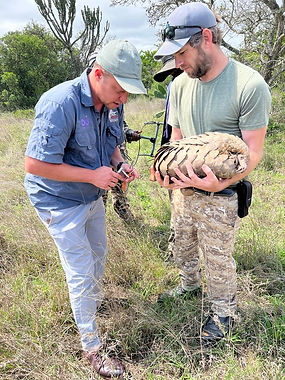South Africa Registered NPC Number: 2019/285721/08
USA 501(c)3 Registered EIN: 88-3925602

PANGOLIN RESCUE FUND
Saving the most trafficked mammal in the world.
United by a shared commitment to protecting one of the world’s most trafficked and vulnerable species, the Scales Pangolin Rescue Fund brings together a diverse network of organizations and individuals. Our collaborative efforts focus on rescuing pangolins from the illegal wildlife trade, ensuring they receive the critical care they need. From rescue and treatment to rehabilitation and monitoring, we provide the necessary funding and to give each pangolin a chance at a successful return to the wild.
The Temminck's pangolins, with their distinctive, scaled bodies and shy, nocturnal habits, are among the most endangered creatures on Earth. Despite their elusive nature, they have tragically become the most trafficked mammal worldwide. Their scales, believed to possess medicinal properties in traditional Asian medicine, are in high demand, while their meat is sought after as an exotic delicacy in some parts of the world.
This insidious trade is driving their populations to dangerously low numbers. In addition to poaching, Temminck's pangolins face other critical threats, including electrocution from the ground level wires of boundary fences, and road fatalities as they attempt to cross increasingly fragmented landscapes. As their habitat dwindles and human encroachment grows, every pangolin rescued becomes vital to preserving the species. It is imperative that we act now to ensure their survival, providing the care, protection, and rehabilitation needed to give these remarkable animals a chance to return to the wild."


Awareness
We are dedicated to stepping up our efforts in addressing this issue. Raising awareness is by no means an easy feat, but through co-operation and education we believe we can facilitate progress in this area. We are always striving to make a difference, and invite you to learn more and lend your support
Rescue
Working closely with law enforcement and the local authorities we assist in sting operations and recovery of trafficked pangolins from the illegal wildlife trade. After their rescue, they are taken directly to our veterinary team to be assessed.


Veterinary Treatment
On admission they are weighed, sedated and put on a fluid drip to assist with dehydration. If the pangolin is female an ultrasound is done to check for pregnancy and X-rays are taken to ensure there are no internal injuries or blockages. They are then tube fed to give them a kick start of strength, and depending on how compromised the individual is, they will stay in ICU until they are strong enough to be moved to the rehabilitation centre for further care
Rehabilitation
This stage can take anything from a couple of weeks, up to a year depending on the condition of the individual when they arrive. During this time, they are housed in a secure location and taken for daily feeding walks allowing them to forage for their favourite ants.


Release & Monitoring
They begin their journey back to the wild being closely monitored. Released in a secure wild area fitted with tracking devices that allow their movements to be tracked remotely, and so they can be physically located for health checks. The pangolins are monitored very closely for the first few days, whilst they familiarize themselves with the area. Once settled, feeding well and finding good shelter to sleep they are then left to continue without constant supervision. Our monitors will locate them daily for the first couple of weeks to do a health check, weighing them to confirm they are still feeding well. Over time this is then reduced to twice weekly, to once a week, to twice a month and then once a month until the team is confident the pangolin is established and happy in its new home. The tags are removed, and the pangolin can continue their life in the wild!
Research
Whilst the monitoring of a pangolin through its various stages of release is important to ascertain its individual needs are being met to ensure a successful release, the data collected during this time is extremely useful for ongoing research. So little is known about these unique mammals, that research is vital to ensure their survival as a species. Our monitoring data is currently being used by scientist Francios Meyer to refine release procedures.
Support the Pangolin Rescue Fund
Pangolins are among the world’s most trafficked mammals, and rescuing them from the illegal wildlife trade requires urgent action and resources. Your donation to our Pangolin Rescue Fund directly supports life-saving operations, veterinary care, and rehabilitation efforts, giving these incredible creatures a second chance. Together, we can protect pangolins and their future. Every contribution counts—click below to make a difference today!
